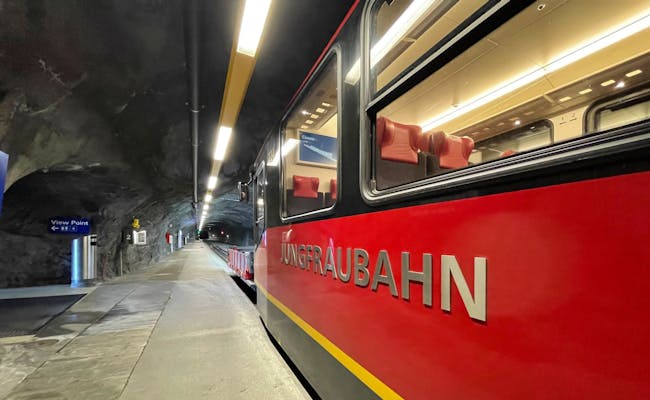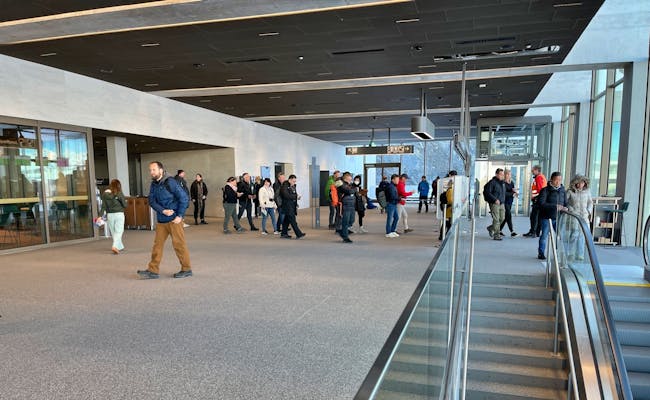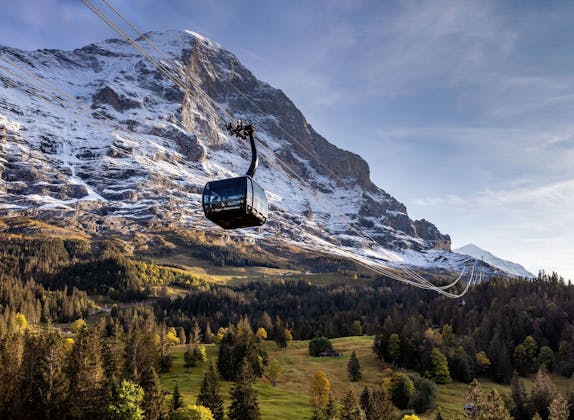
Ab Grindelwald: Ticket Jungfraujoch inkl. Sitzplatzreservation
Validity: All day
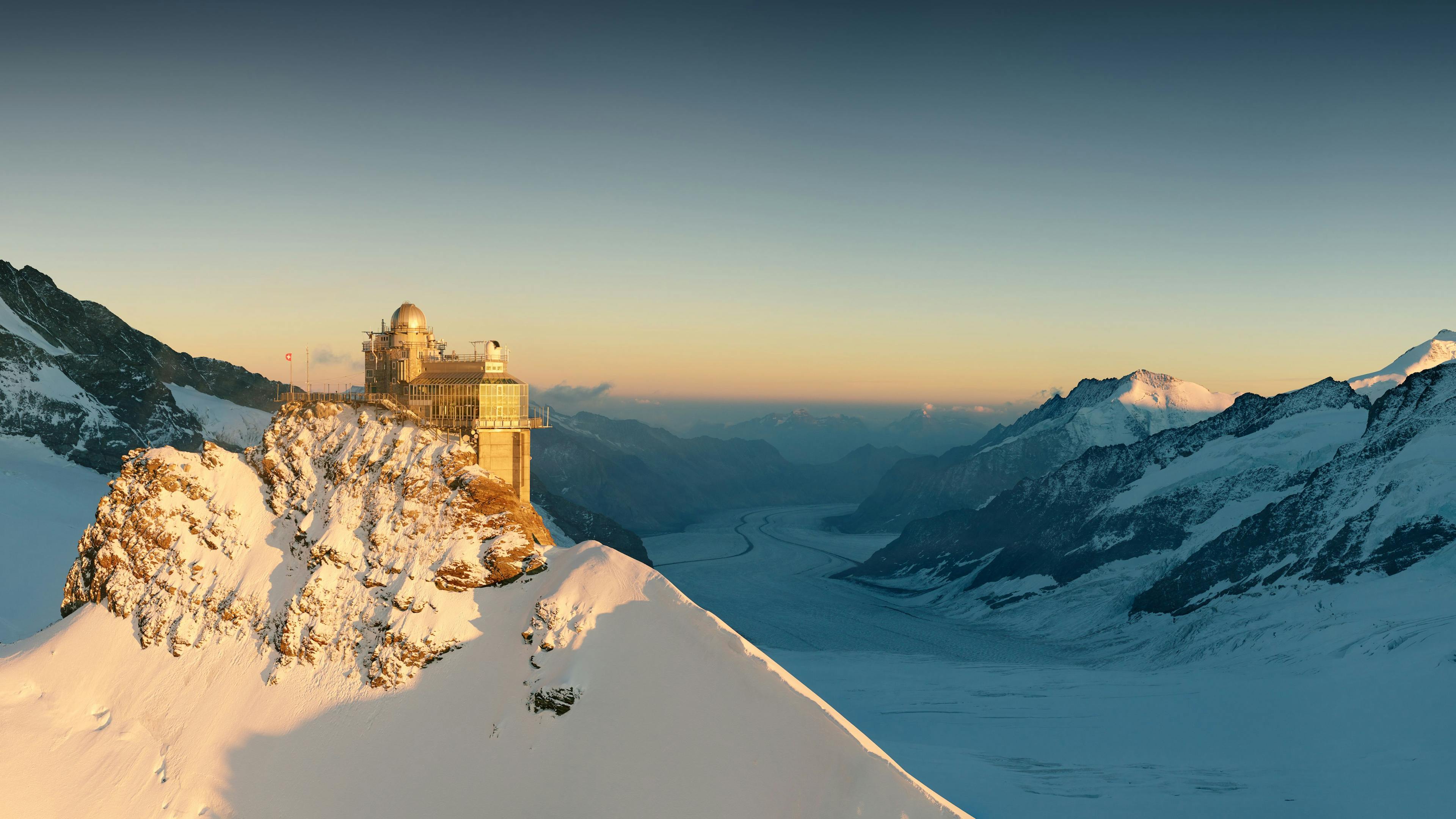
10 Activities
Filter
Better than 4.5 stars
Better than 4 stars
Better than 3.5 stars
Better than 3 stars
No Rating

Validity: All day
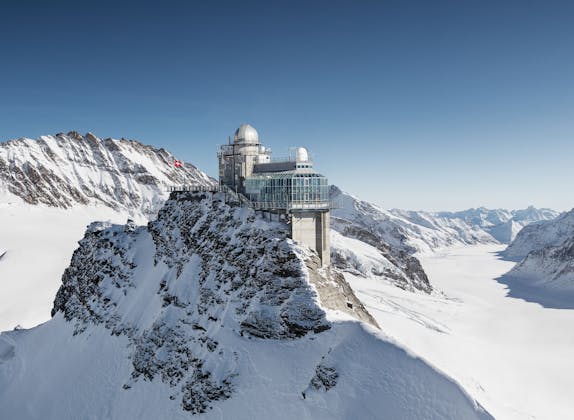
Validity: All day
Why book with Swiss Activities?

Duration: 11:30 hours
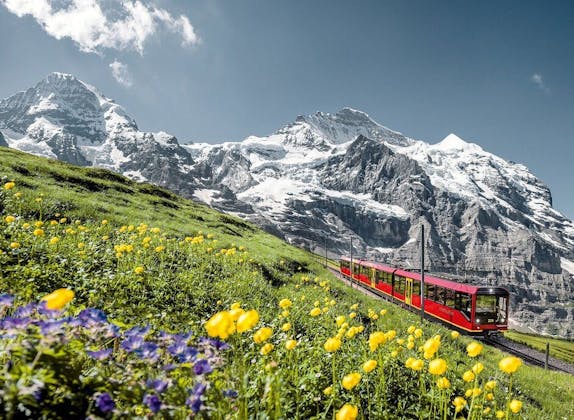
Duration: 7 hours
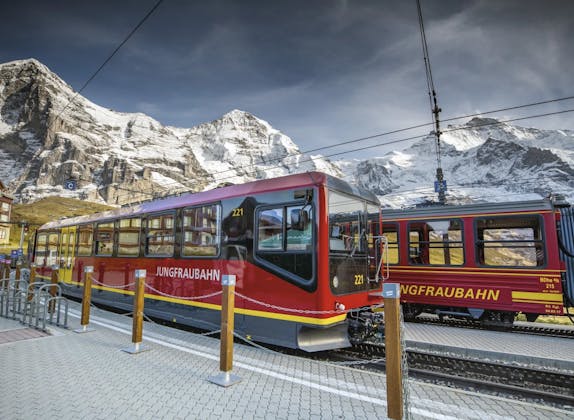
Validity: All day

Duration: 12 hours

Duration: 11:45 hours
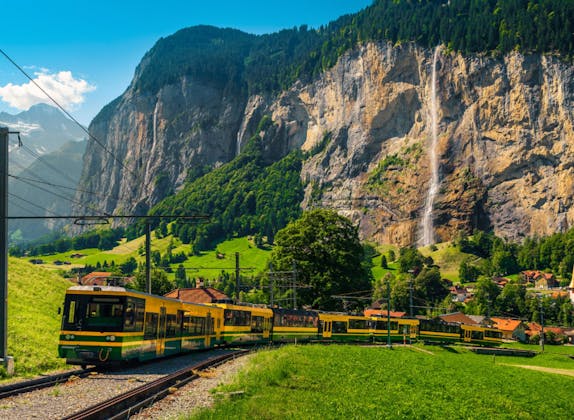
Duration: 10:30 hours

Duration: 10 hours

Ticket
High demandbooked 16,536 times

Ticket
High demandbooked 13,865 times
Why book with Swiss Activities?

Tour
High demandDuration: 11:30 hours
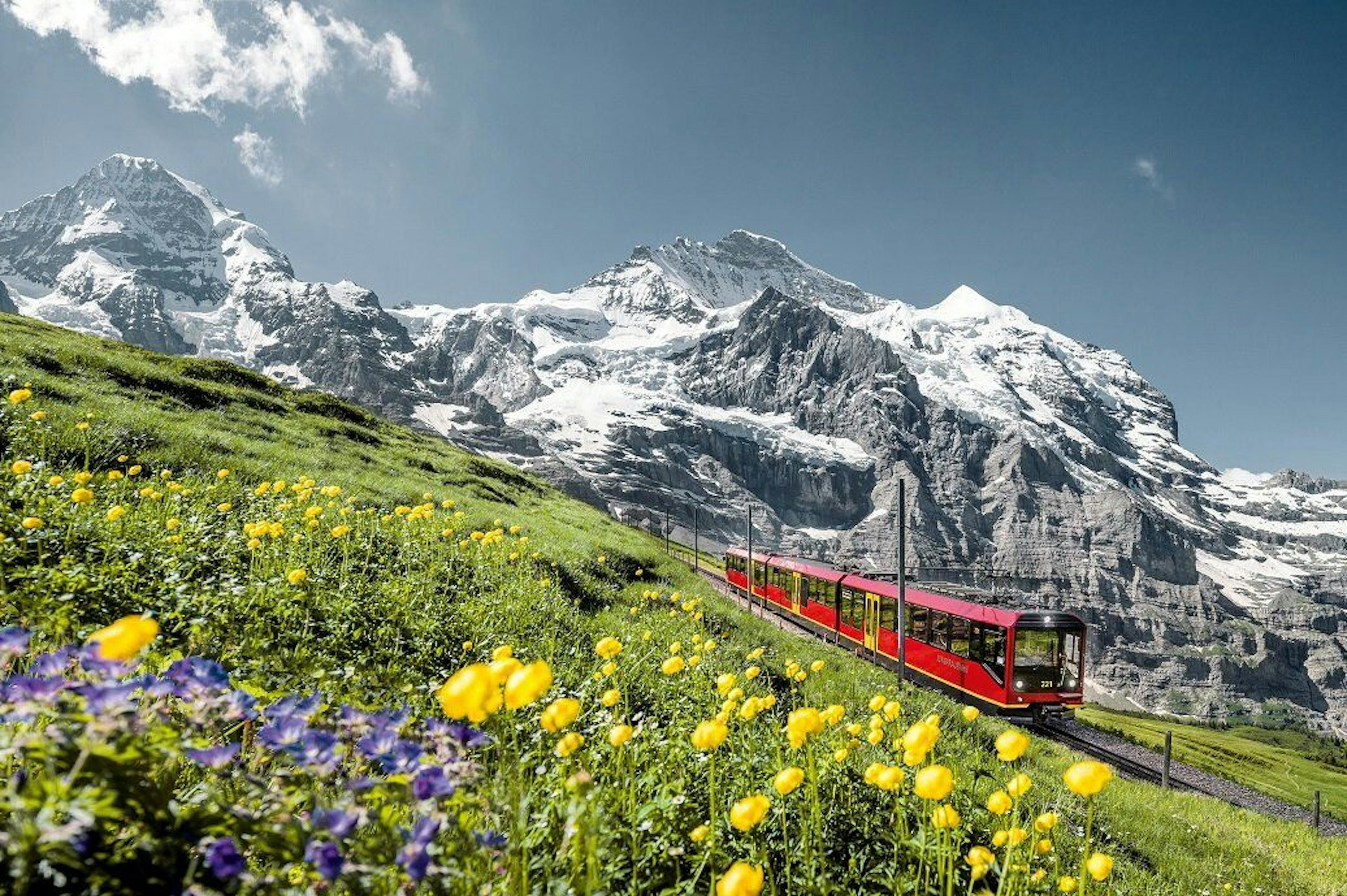
Tour
Duration: 7 hours
booked 153 times

Ticket
High demandbooked 2,829 times
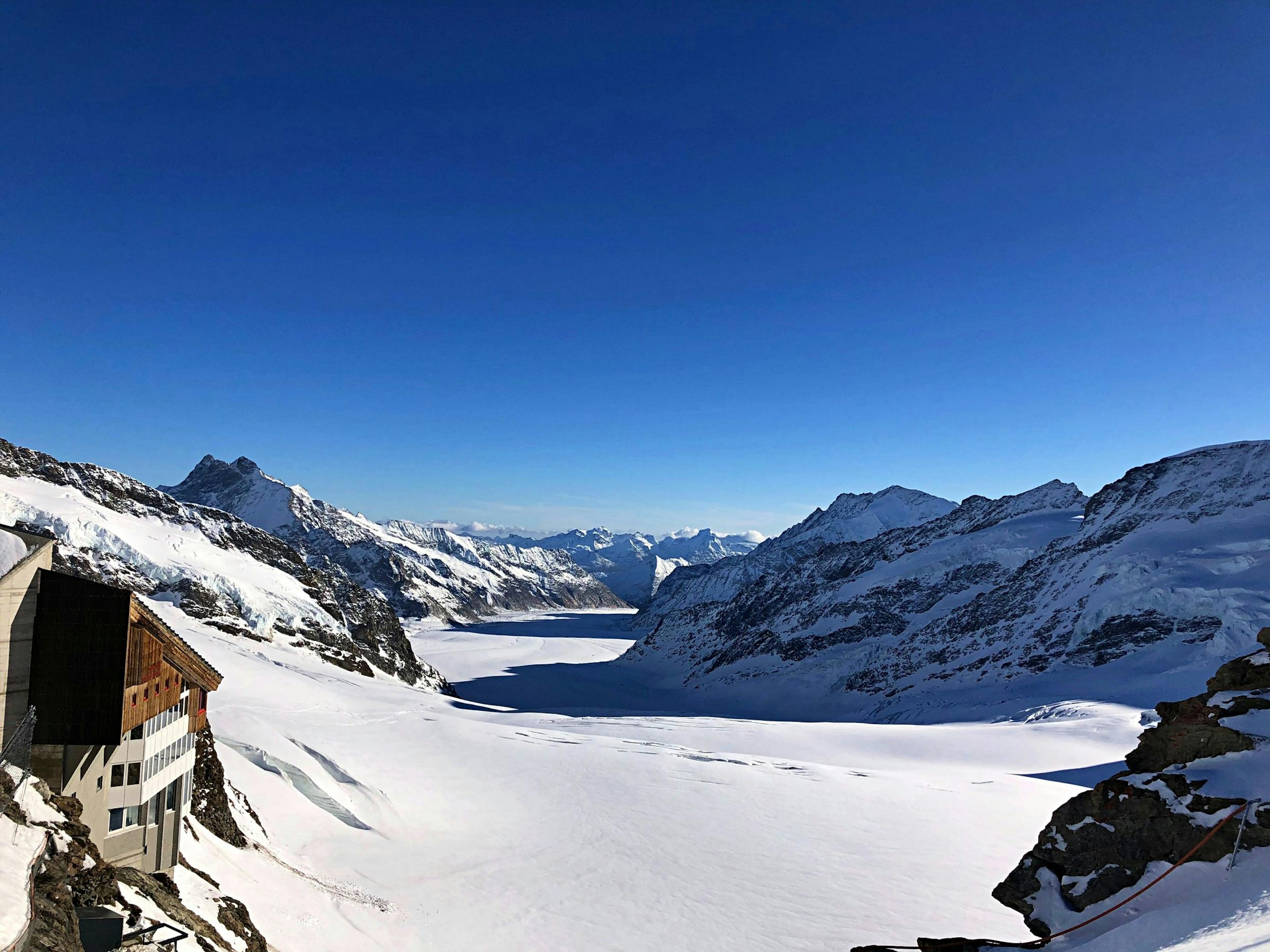
Tour
Duration: 12 hours
booked 234 times
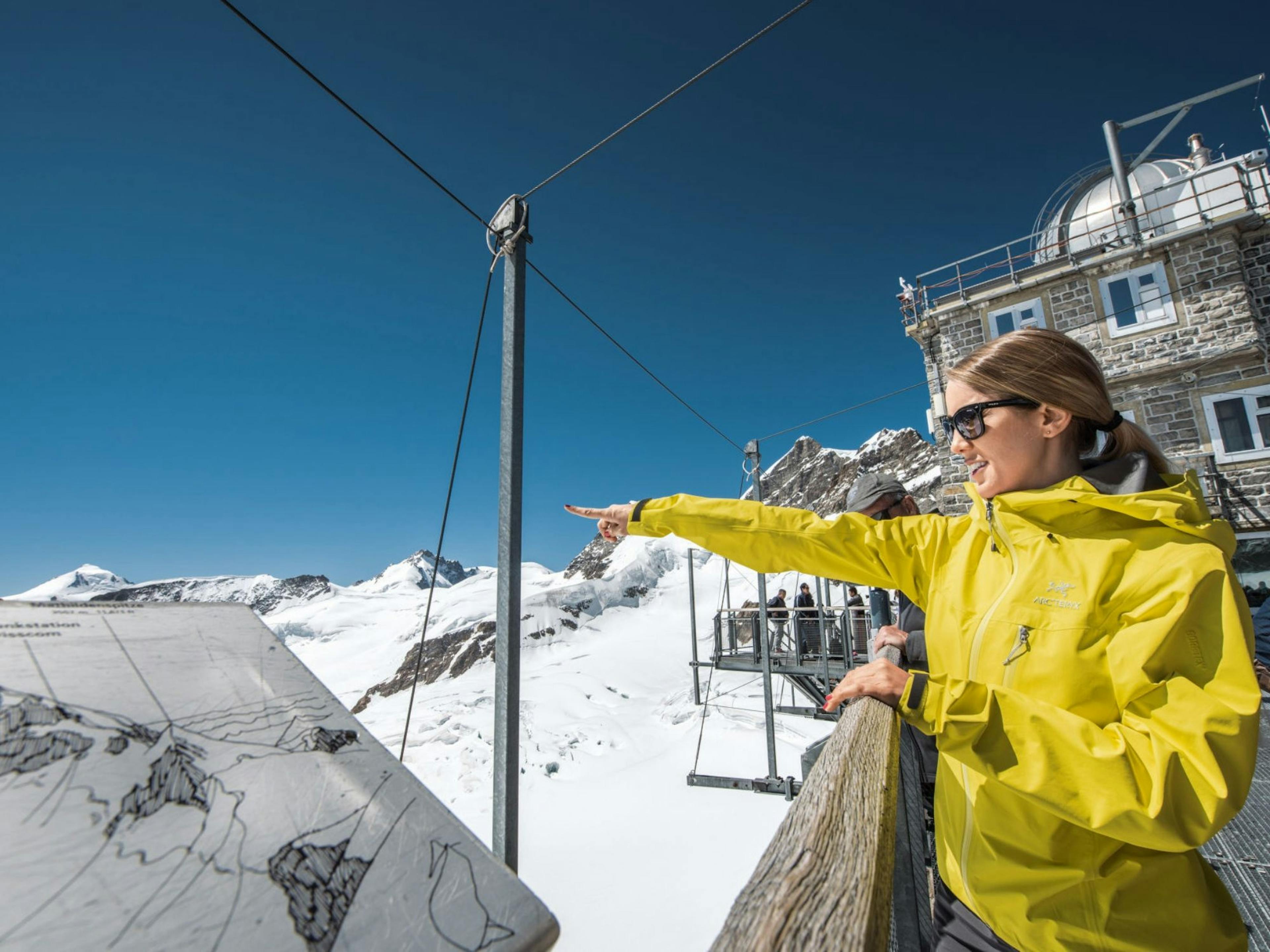
Tour
Duration: 11:45 hours
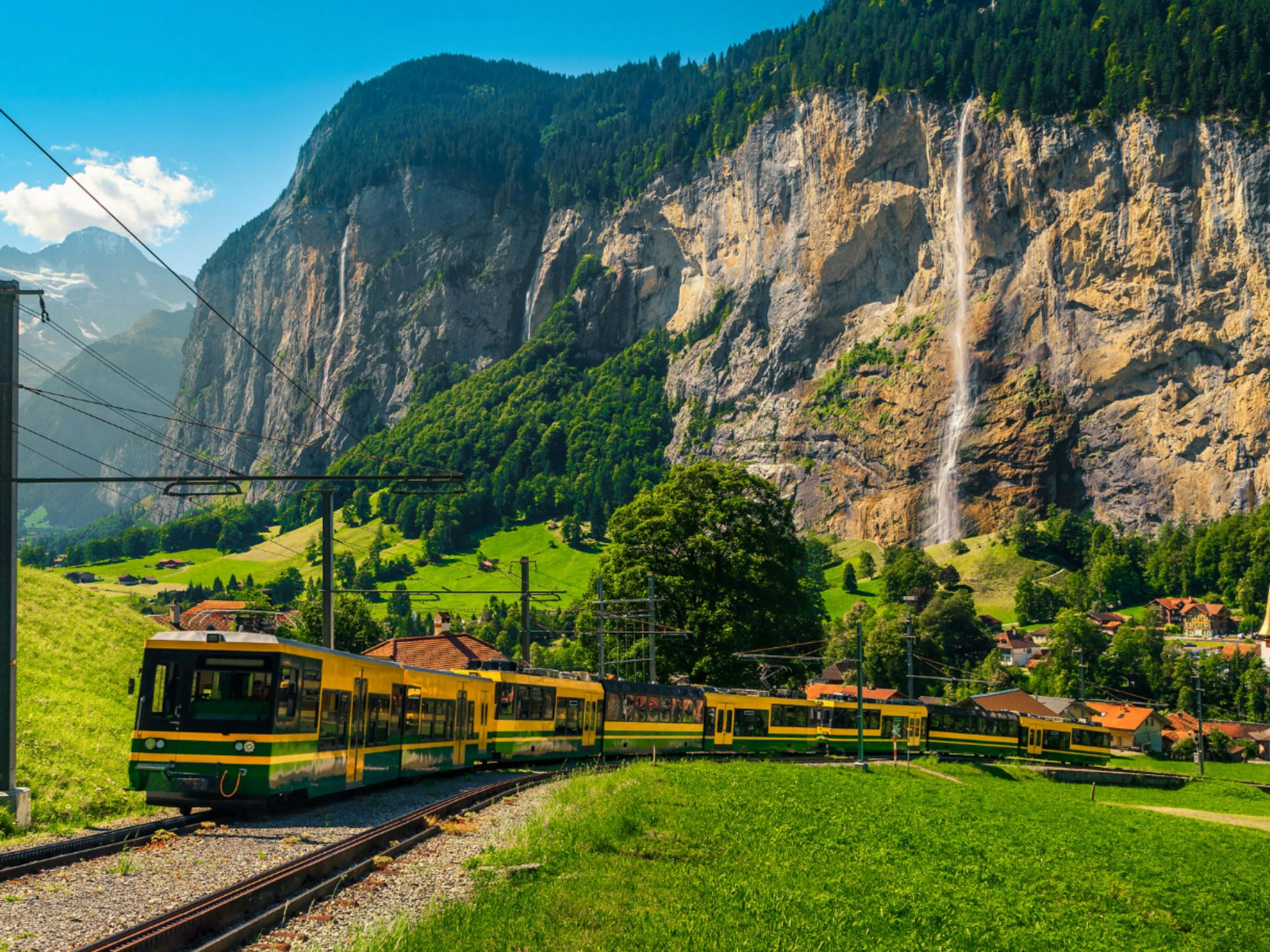
Tour
Duration: 10:30 hours
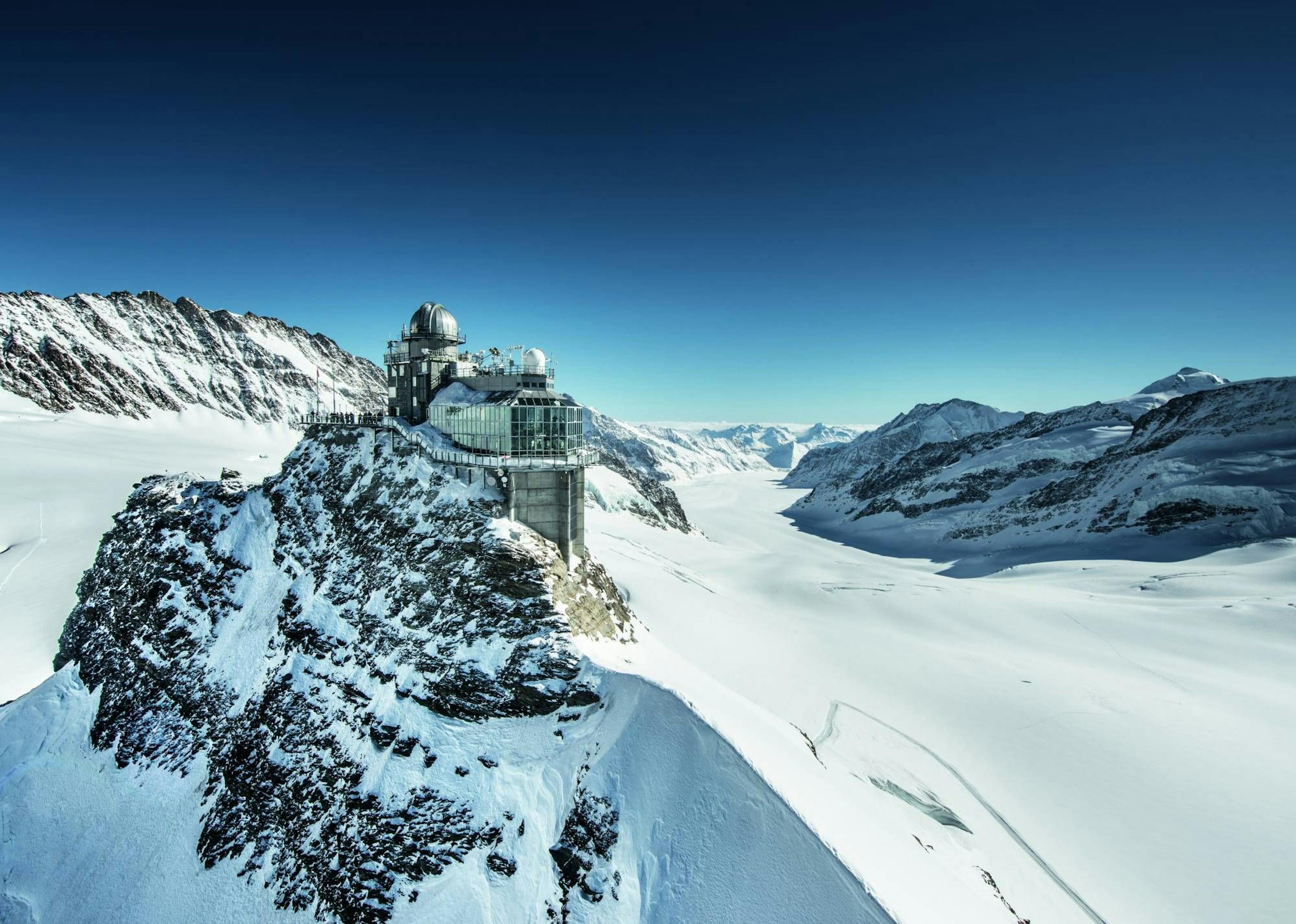
Tour
Duration: 10 hours
booked 53 times
"Top of Europe" is the name given to the railroad station, which is the terminus of the railroad to the Jungfraujoch inside the Sphinx at 3454 m above sea level.
Even the ride on the Jungfrau Railway is a very special experience. The Jungfraujoch has been accessible via the Jungfrau Railway from the Kleine Scheidegg valley station since 1912. The journey takes 35 minutes. Guided glacier hikes are possible from the Jungfraujoch, revealing a very beautiful and extraordinary glacier world. Even those who do not dare to do so can experience the unique glacier world from the glacier platform.
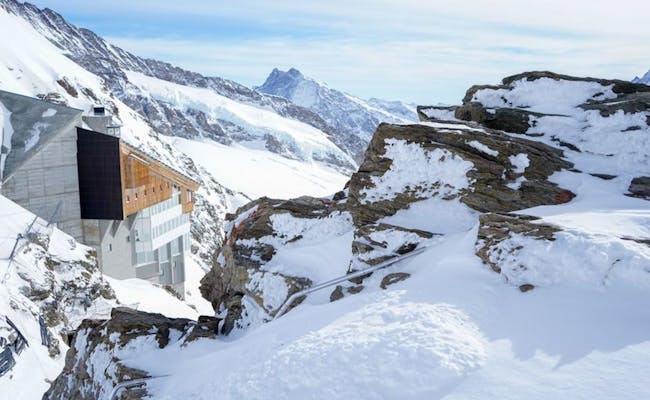 Top of Europe (Photo: Jungfrau Region)
Top of Europe (Photo: Jungfrau Region)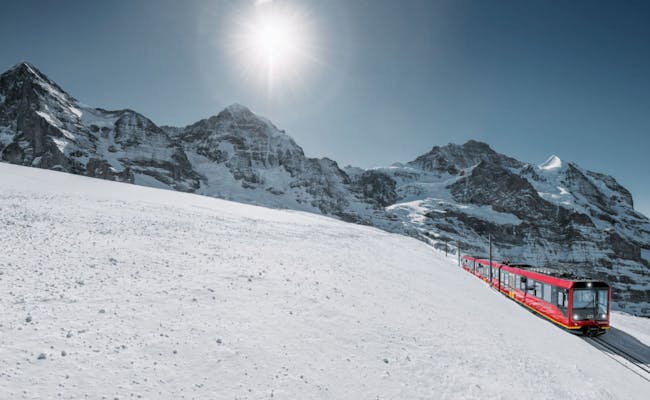 Jungfraubahn (Photo: Jungfraubahnen)
Jungfraubahn (Photo: Jungfraubahnen)Jungfraujoch is the connection point between the peaks of the Jungfrau and Mönch mountains. It’s located on the border of the Bernese Oberland and Valais regions. Jungfraujoch is part of the UNESCO World Heritage site "Swiss Alps Jungfrau-Aletsch."
A train ride on the Jungfrau Railway to the "Top of Europe" is already part of the experience at the pass. Observation platforms on the Sphinx Rock next to the observatory and above the Top of Europe station provide an overview of the area, and with good weather, the view extends even further. Popular destinations include the Great Aletsch Glacier, the Ice Palace below, and the ice caves at the edge of the glacier.
Key attractions include:
At Jungfraujoch, the Sphinx Observatory stands on a rocky outcrop. It is managed by a foundation of Jungfrau Railway Holding AG. Apart from an astronomical dome and a weather observation station, it consists of several laboratories, a workshop, and two terraces used for scientific projects.
The 76 cm telescope in the dome is no longer in use. The observatory undertakes various projects, including long-term studies. On the Jungfrau eastern ridge, at an altitude of 3,700 meters, climate and environmental measurements are primarily conducted. A heated entrance system is installed on the roof. From the Jungfraujoch station, the path goes through a 560-meter-long tunnel through the ice, plus a funicular that overcomes a height difference of 240 meters.
The weather station is the highest permanently manned weather station in the world. Measurements of about 25 weather elements are sent every ten minutes to the headquarters in Zurich. These facilities cannot be visited from the inside.
The observation platform of Jungfraujoch surrounds the observatory. The Sphinx observation platform is positioned 3,571 meters above sea level. It offers a panoramic view over the Alps, which on clear days can reach as far as the Vosges and the Black Forest. On the other side, a view over the Aletsch Glacier is possible.
Since 1996, the observation hall has been glass-enclosed, and terraces surround the observatory building. A 111-meter lift leads to the observatory, covering this distance in 25 seconds. Above the observation platform, taut steel cables run, forming a Faraday cage that protects against lightning strikes, which can occur even in clear skies at this altitude.
The observation platform is open daily during train operating hours.
Visitors to Jungfraujoch can reach the plateau directly via paths above the Ice Palace. It is situated at an elevation of 3,451 meters.
The scenic glacier platform is covered in snow and ice year-round. It serves as a viewpoint, a place for photography, and a meeting point for guided trekking tours over the Aletsch Glacier, ski tours, and hikes. Events also take place here, and during the pre-Christmas season, a Christmas tree is set up, which is visited by Samichlous on December 6 and by the Christkind on Christmas Eve.
From the train station, the path leads up through the tunnel system. Below the entrance to the Ice Palace, the route goes outward and gently inclines toward the plateau.
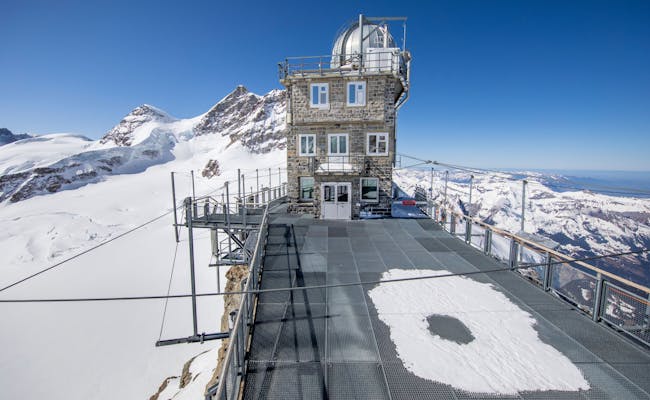 Sphinx Terrace (Photo: Jungfrau Railways)
Sphinx Terrace (Photo: Jungfrau Railways)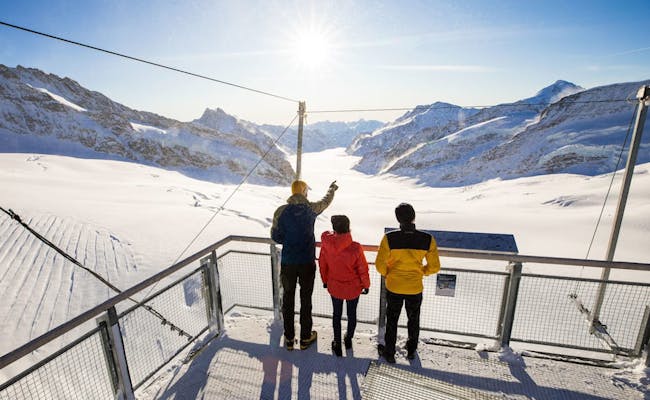 Sphinx View (Photo: Jungfrau Railways)
Sphinx View (Photo: Jungfrau Railways)The ICE gateway guides visitors from the Jungfraujoch down to the Ice Palace. In the 1930s, mountain guides created the passages and halls with saws and picks. They are located about twenty meters below the Aletsch Glacier
The labyrinth of winding ice paths with cave-like halls and rooms covers a total of 1,000 square meters. Today, works of art made of ice are exhibited here in niches next to the partially mirror-smooth passages. Eagles, bears, dogs, ibexes or penguins are among the works of art that an artist creates each year. Even "Charlie Chaplin and the kid", a scene from Chaplin's World Museum, has already been created in ice and exhibited here. The temperature of the ice palace must be constantly maintained at a temperature of -3°C. The vault and the ceilings have to be regularly reworked because of the evaporation of the visitors. There are railings in slippery places.
The Ice Palace is open daily from 7:30 am to 4:15 pm.
Just before the entrance to the Ice Palace, a view of the mountain interior is possible. From a bridge, at an altitude of 3,483 meters, it is possible to view a karst cave made visible by the construction of the tunnel.
Below the Jungfraujoch, a 250-meter tunnel depicts the beginnings of the Jungfrau Railway. The tunnel runs between the Ice Palace and the Sphinx Hall. Visitors experience the pioneering era of the railroad and the mountain in the multimedia display of Alpine Sensation, partly on moving walkways.
A film projection room is located in the Sphinx Hall. A 360-degree cinema shows the high alpine world around the Jungfraujoch. The adventure tour is 250 meters long and contains adventure niches at intervals
For example, the brothers Rudolf and Hieronymus Meyer from Aarau stand as Jungfrau first climbers. Two Valais mountain guides can also be seen: Alois Volken and Joseph Bortis. Original black and white photographs are accompanied by sounds of railroad construction. Thirty commemorative plaques tell of the victims of the Italian miners during the railroad development of the Jungfraujoch. The young men were no more than twenty years old. The Alpine Sensation covers 1,200 square meters and is open all year round.
At the Jungfraujoch, the Aletsch Glacier begins to the south and, at twenty-two kilometers long, is the longest glacier in Europe. The ice masses cover an area of about 80 km². Glaciers consist of ice, firn on top and snow at the very top. Firn is older snow that has acquired a higher density through thawing and freezing. About one meter of firn is created from eight meters of new snow.
From the Jungfraujoch, the glacier leads to the Konkordiaplatz, which covers an area of 6 km². At this point four glaciers meet and flow together as the Great Aletsch Glacier further south. The firn depressions come largely from regions around 3,800 meters above sea level from mountains such as Jungfrau, Aletschhorn, Mönch, grosses Fischerhorn, Grünhorn, Kranzberg and Trugberg.
The four glaciers:
The Great Aletsch Glacier is 900 meters thick and weighs about 27 billion tons. It moves about 200 meters per year at the Konkordiaplatz. Differing flow velocities within the glacier create stresses that lead to deep cracks.
The Jungfrau Panorama film provides an all-round experience of the mountain world around the Jungfraujoch. Visitors get the feeling of flying through clouds, plunging into masses of snow or even sinking into crevasses of ice. The film is shown on all days as long as the mountain railroads are running.
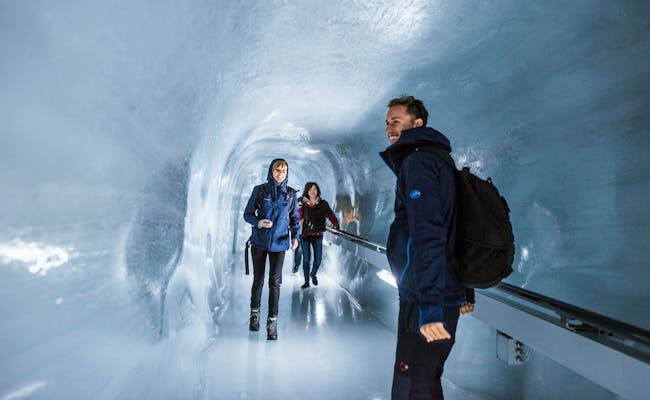 Ice Palace (Photo: Jungfrau Railways)
Ice Palace (Photo: Jungfrau Railways)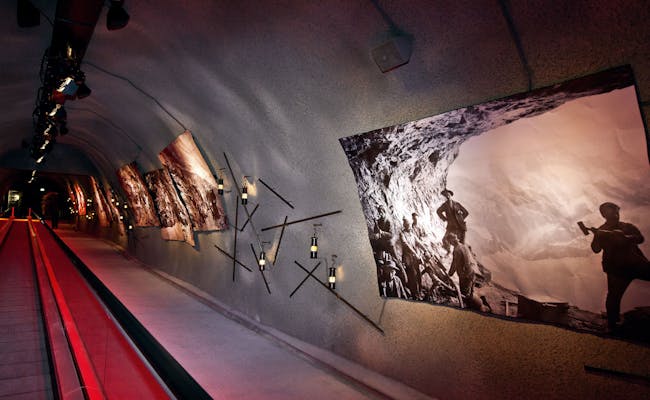 Alpine Sensation (Photo: Jungfraubahnen)
Alpine Sensation (Photo: Jungfraubahnen)The pass has been accessible since 1912 via the Jungfrau Railway, which has its valley station at Kleine Scheidegg. The Jungfrau Railway is an electric cogwheel train. The route from Kleine Scheidegg to Jungfraujoch winds its way through Eiger and Mönch.
Seven kilometers of the total 9.34 km that the train covers are in a tunnel, climbing around 1,400 meters in elevation. Before reaching its final destination, the Jungfrau Railway stops at the Eigergletscher (2,320 m above sea level) and Eismeer (3,158 m above sea level) stations. The train's final stop at Jungfraujoch is located inside the Sphinx at an altitude of 3,454 meters. The Sphinx refers to a rocky summit at Jungfraujoch, home to the Sphinx Observatory. The ride takes 35 minutes.
Trains returning downwards pause for five minutes at two viewing windows that were used during the construction of the railway to remove the excavated material. The train still operates using 1,125 V alternating current and therefore has two parallel tracks. During the descent, the braking energy is fed back into the overhead line as electrical energy.
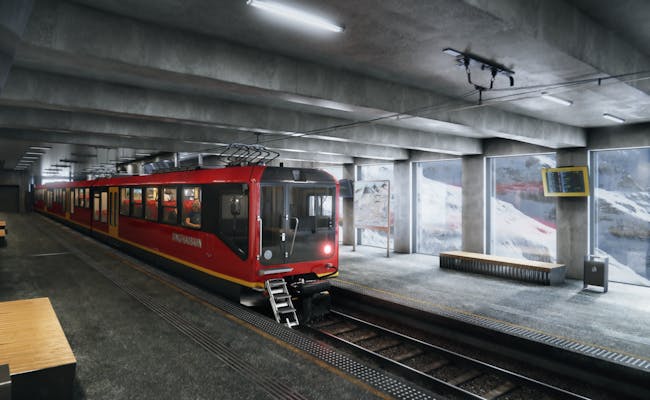 Eigergletscher Station (Photo: Jungfraubahnen)
Eigergletscher Station (Photo: Jungfraubahnen)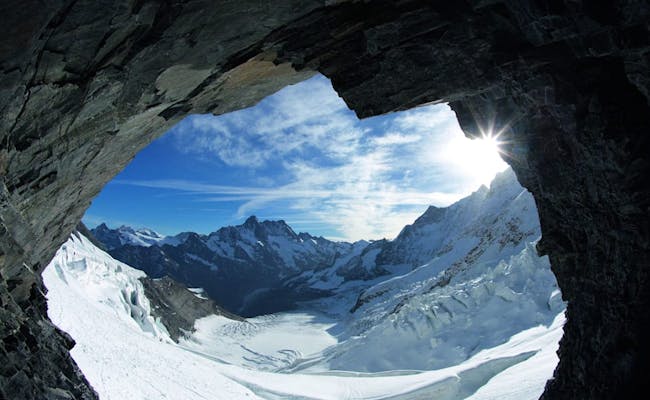 Ice Sea Viewing Window (Photo: Jungfraubahnen)
Ice Sea Viewing Window (Photo: Jungfraubahnen)From Grindelwald Terminal, the Eiger Express cuts the overall travel time to Jungfraujoch compared to the cogwheel train in half. At the Eigergletscher, you will then switch to the cogwheel train.
The Eiger Express is a three-cable aerial tramway that stretches 6,483 meters and overcomes an elevation of 1,391 meters.
Offers from Swiss Activities:
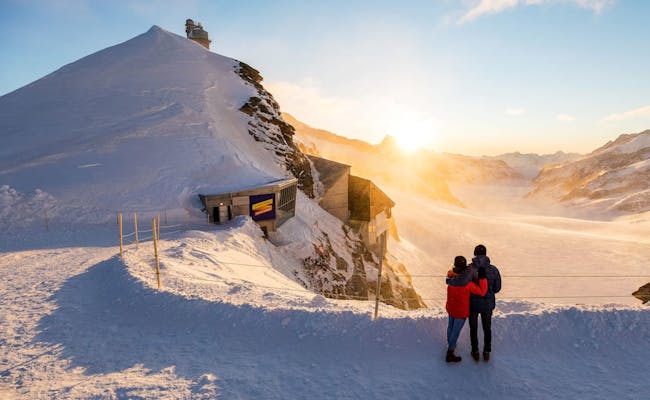 Sunrise (Photo: Jungfraubahnen)
Sunrise (Photo: Jungfraubahnen)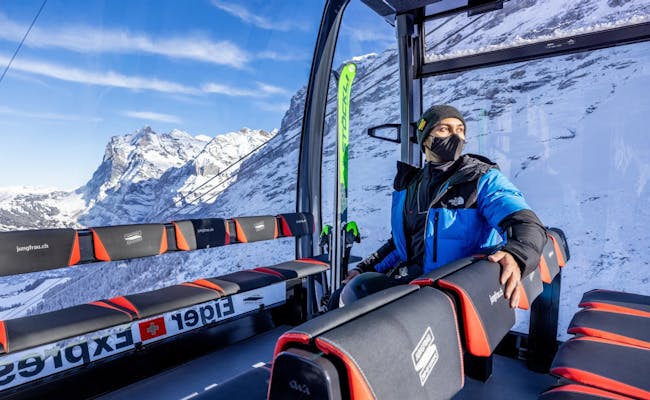
Numerous hikes and glacier trekking tours are undertaken in the region in summer with mountain guides. The weather is always unpredictable up here, but summer is certainly more suitable. Some activities can be carried out on the Jungfernjoch glacier all year round.
These include some of the summer hikes in good weather conditions. The shelters of the mountain huts are also open to alpinists in winter. Fuel is available and there are cooking facilities and showers. However, hikes and trekking tours across the glacier should only be undertaken by alpinists or with a mountain guide.
Even though these activities can be carried out all year round, the weather conditions on the Jungfraujoch must be taken into account.
The excursion destinations at the Top of Europe are also open to visitors all year round.
The activities primarily include
In summer, the Aletsch Glacier is used by mountaineering schools and private mountain guides for glacier trekking from the Jungfraujoch. These tours are also suitable for beginners with a normal level of fitness. They are trekking tours that involve five to six hours of walking in thinner air.
Glacier hikes on your own require a good knowledge of the technical and navigational challenges, as the conditions on the glacier can change dramatically in a very short time.
Ski tours on the Aletsch Glacier, for example, have the Lötschenlücke as their destination. High mountain tours to the Eiger, Jungfrau, Mönch and other peaks also start here.
Hikes from the Jungfraujoch across the glacier to the Konkordiahütte start at the Sphinxstollen of the Jungfraujoch. The Konkordiahütte consists of several buildings and belongs to the Swiss Alpine Club SAC.
Tours to the Konkordiahütte are carried out as one-day or multi-day hikes. They continue the following day, for example, to Riederalp or Märjelesee.
The Konkordiahütte stands at 2,850 meters above sea level, more than 150 meters above the Konkordiaplatz. The SAC gives these approaches to the hut:
From the Jungfraujoch (3,454m) the trail goes via the Sphinxstollen to the Jungfraufirn. Afterwards, a descent over two glacier depressions, one behind the other, leads down to a flatter terrain, where the Jungfraufirn meets the Ewigschneefäld. Then the moraine and the glacier stream are crossed. A gentle climb leads to the S foot of Grünegg and over a second moraine. Clearly visible metal stairs lead up to the hut. In summer, the path quickly becomes slippery due to snow melt. Temporary bridges make the paths passable in summer.
Via the Sphinxstollen, the trail leads to the Konkordiaplatz via the Jungfraufirn southeastward down, across the wide area to the eastern edge to the ski depot of the hut at the foot of the metal ladders.
Via the Sphinxstollen, head northeast along the winter hiking trail to the Oberen Mönchsjoch (3623 m). Via the Ewigschneefäld the descent leads down to the rock spur (point 3135). East of the glacier break (on the left) it goes down through a hollow to the Konkordiaplatz to the ski depot of the hut at the foot of the metal stairs.
The Konkordiahütte has 155 sleeping places and a shelter with 35 places. Overnight stays must be reserved in advance. The hut is closed from mid-September to mid-March. The winter room is located below the main hut in the Hasler hut and offers shelter and protection during the unattended period. A wood stove, beds, blankets, pillows, light as well as emergency provisions are available in the hut.
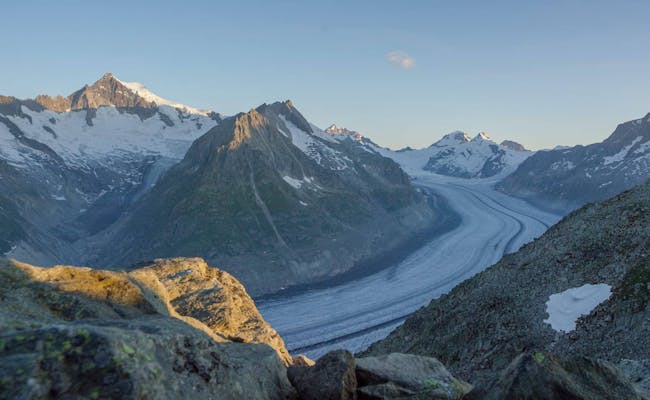 Aletsch Glacier Middle Moraines (Photo: Jungfrau Railways)
Aletsch Glacier Middle Moraines (Photo: Jungfrau Railways)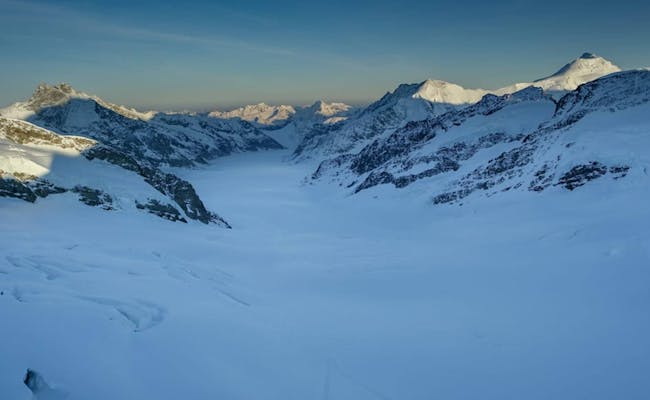 Aletsch Glacier (Photo: Jungfrau Railways)
Aletsch Glacier (Photo: Jungfrau Railways)From the railroad station on the Jungfraujoch, a trail leads from the tunnel system below the Sphinx directly to the Mönchsjochhütte. It leads from the exit of the Sphinx tunnel directly across the glacier and is accessible from mid-March to mid-October. The trail is well marked and a snow groomer grooms it daily.
This hike is also suitable for children. However, good footwear and weather-appropriate clothing are important for the snow-covered trail. During the hike, the 4000-meter mountains can be viewed in the immediate vicinity.
A hike without a stop takes about two hours including the way back. There is a difference in altitude of 200 meters. The Mönchsjochhütte is located at 3657 meters above sea level and offers a restaurant as well as overnight accommodation for up to 120 people.
Overnight stays must be reserved in advance and you should bring your own hut sleeping bag. The highest guarded hut in Switzerland stands southeast of the Mönch. Poles support the hut built directly against the rock.
The hut is closed from mid-October to mid-March. During this time, up to 16 sleeping places can be booked in two rooms, which have a wood stove and crockery. Access to the hut in this period is possible for experienced mountaineers.
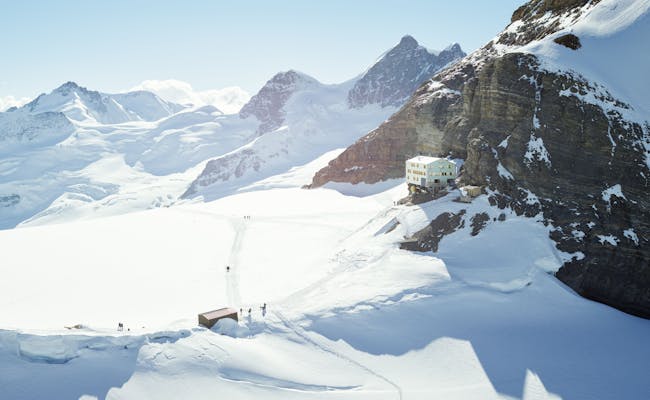 Mönchsjochhütte (Photo: Jungfrau Railways)
Mönchsjochhütte (Photo: Jungfrau Railways)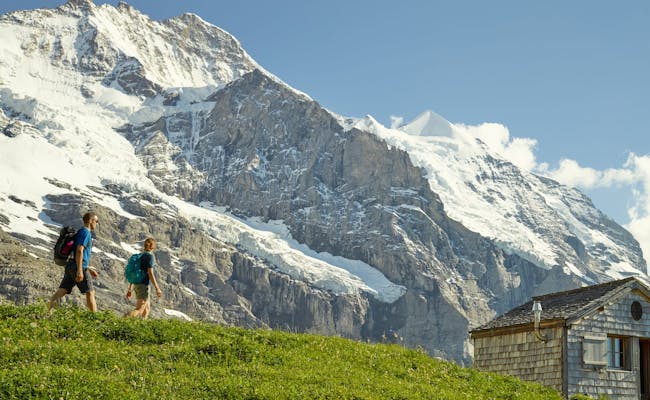 Mittellegihütte Eiger Walk (Photo: Jungfraubahnen)
Mittellegihütte Eiger Walk (Photo: Jungfraubahnen)The ice caves are located below the Jungfraujoch on the edge of the glacier. The entrances to the ice caves are accessible. Thus, the deep blue ice caves can also be hiked inside.
As a result of glacier recession, individual hiking trails had to be closed again and again in the past. Slopes started to slide because the pressure on the surrounding rock decreased. For this reason, the full-day hike should only be done with an authorized mountain guide and is also possible for school children.
Guided glacier hikes to the ice caves start in Moosfluh or from Bettmeralp. During the hike the glacier is always in view. For the start from Moosfluh, the approach begins in eastern Riederalp via the Riederalp - Moosfluh cable car. From Bettmeralp guided "Gletschertouren Katzenlöcher" to the ice caves are offered with the following schedule:
The best time for these hikes is from June to October.
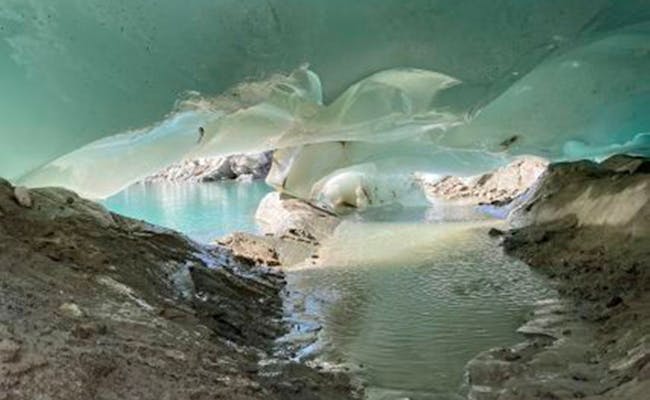 Ice Cave (Photo: Switzerland Tourism MySwitzerland)
Ice Cave (Photo: Switzerland Tourism MySwitzerland)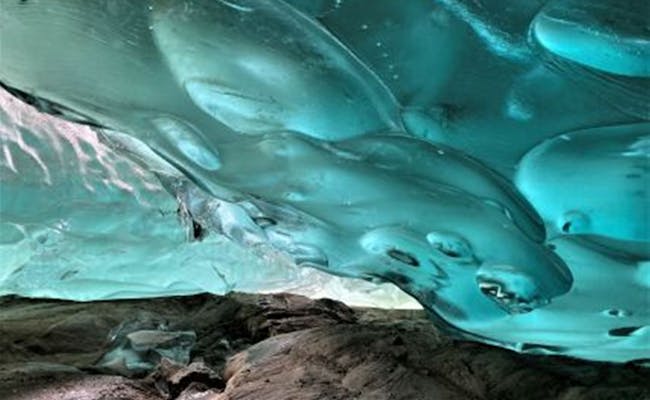 Ice Cave (Photo: Switzerland Tourism MySwitzerland)
Ice Cave (Photo: Switzerland Tourism MySwitzerland)There are challenging via ferratas near the Jungfraujoch. Some sections may only be climbed in the company of a mountain guide. The via ferratas are secured by wire ropes, iron steps or wire ropes.
In addition to a good physical condition, the right equipment for the via ferratas is very important. This includes a climbing helmet, via ferrata set, climbing harness, webbing sling, via ferrata shoes, via ferrata gloves and HMS carabiners.
The German Alpine Association DAV gives ten recommendations for via ferrata.
The via ferrata via Ferrata Aletsch includes climbing passages in the upper Massaschlucht. It leads around the Gibidum reservoir. The 80m long and 40m high Nepal Bridge is a particular challenge. Climbing experience is important on the steep rock faces of the Stockflüe, as there are several difficult traverses.
The via ferrata Eggishorn requires in particular a head for heights and surefootedness. A 40-meter-long three-rope bridge and a 30-meter-long suspension bridge are the special features of this A further 30-meter-long tyrolienne (rope slide) may only be used in the company of a mountain guide. However, it can be bypassed.
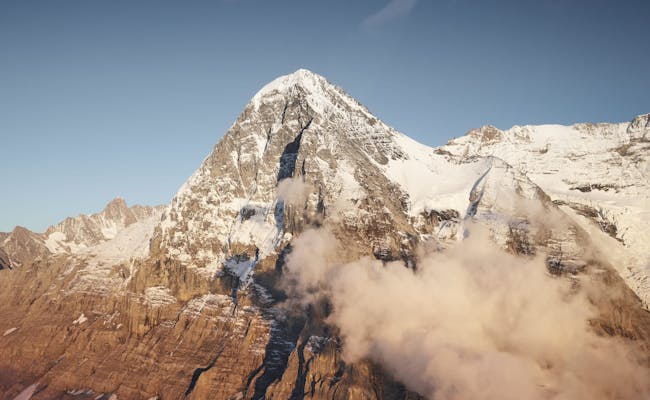 Eiger North Face (Photo: Jungfrau Railways)
Eiger North Face (Photo: Jungfrau Railways)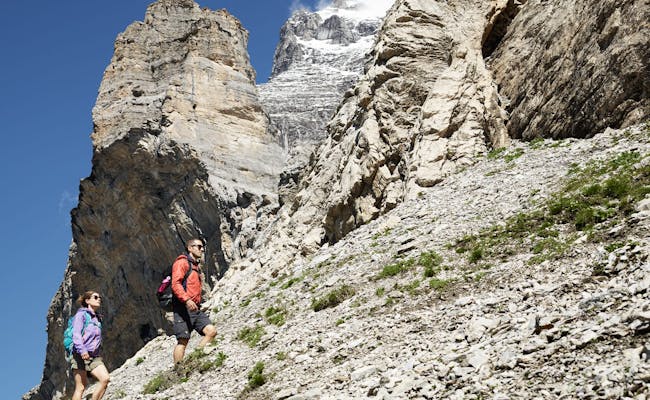 Eiger Summer (Photo: Jungfrau Railways)
Eiger Summer (Photo: Jungfrau Railways)Helicopter flights to the Jungfraujoch start, for example, at the Gsteigwiler heliport near Interlaken or at the Croix de Coeur altiport in Lauterbrunnen. During the flight, there is a direct view of the 4,158-meter-high Jungfrau mountain peak, as well as the Mönch and Eiger.
Disembarkation is either directly on the glacier or at the starting point. Without exit the helicopter flight lasts about twenty minutes, with exit thirty minutes.
Some helicopter flights combine the tour with the Matterhorn. They take about sixty minutes as a sightseeing flight, including glacier landing correspondingly longer.
45-minute sightseeing flights around the Jungfraujoch start from Bern-Belp airport. They lead along the Aare, over Lake Thun, past the north face of the Eiger to the Jungfraujoch. The return flight is along the Schilthorn over the area of Lauterbrunnen back to the starting point.
Flights with a helicopter to or around the Jungfraujoch usually take place with five passengers.
There are a few things to keep in mind:
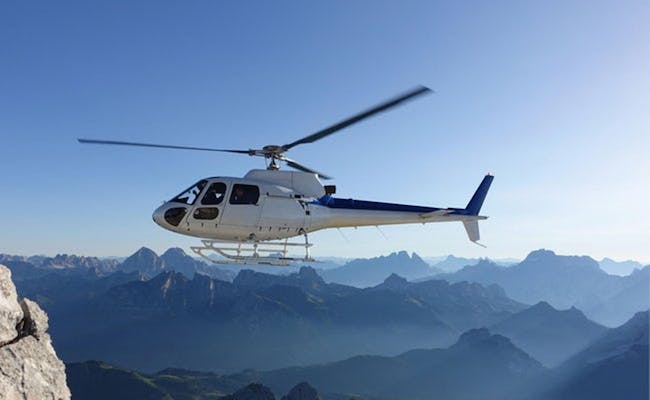 Helicopter flight sightseeing tour (Photo: Fun Flights)
Helicopter flight sightseeing tour (Photo: Fun Flights)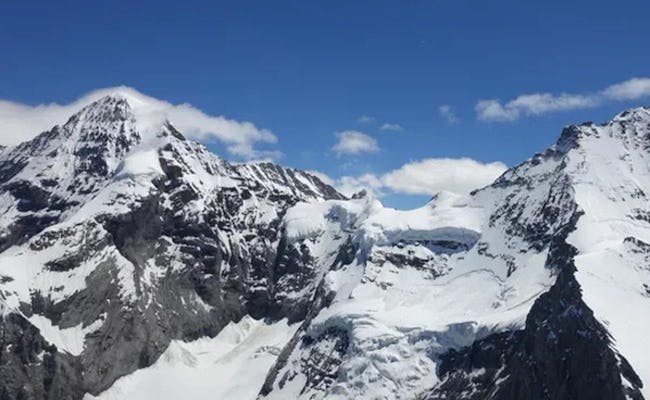 Helicopter Flight Sightseeing Flight (Photo: Fun Flights)
Helicopter Flight Sightseeing Flight (Photo: Fun Flights)In addition to snow, the Snow Fun Park has another attraction to offer in summer: a zipline. It is called Flying Fox, Tyrolienne or Zipline and is open daily from the end of May to mid-October from 10:30 to 17:00.
Snowkiting at the Jungfraujoch is carried out directly on the glacier. The prerequisites for this are appropriate snow and wind conditions. Trained snowkiters or beginners under professional guidance can snowkite at Schneefäld, for example.
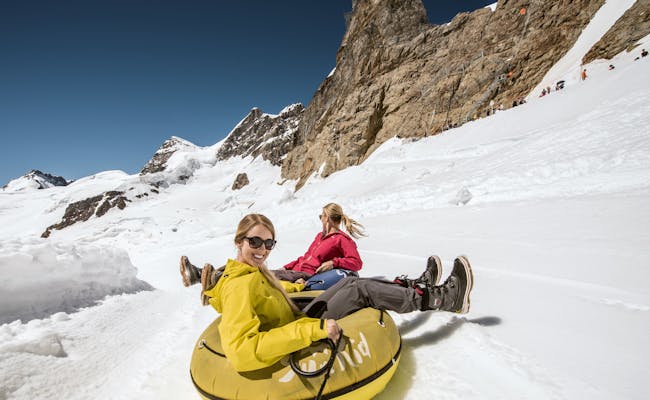 Snow Fun Park (Photo: Jungfraubahnen)
Snow Fun Park (Photo: Jungfraubahnen)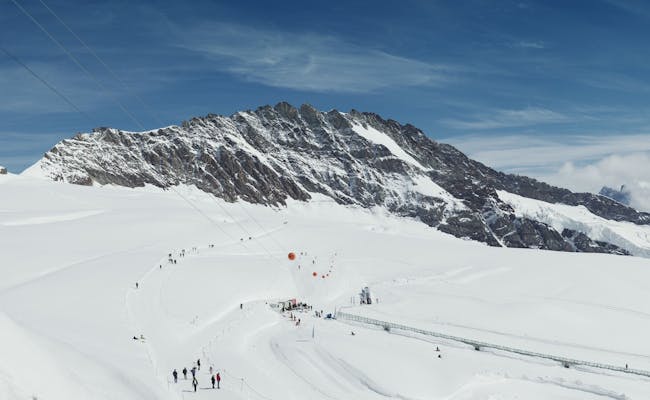 Snow Fun Park (Photo: Jungfraubahnen)
Snow Fun Park (Photo: Jungfraubahnen)There are several restaurants and bars on the Jungfraujoch. They offer food and drinks as well as the view of snow, mountains and panorama.
The Aletsch self-service restaurant offers traditional Swiss dishes, Rugenbräu beer, a top-of-Europe wine and various non-alcoholic refreshments. It is open daily during the day 10:15 - 14:30.
The self-service Bollywood restaurant has Indian and Asian cuisine on the menu. It stands at 3,454 meters above sea level and offers a direct view of the glacial panorama of Europe's longest glacier. The self-service Speedy restaurant is located in the reception hall of the Top of Europe station on the first floor. It offers homemade cakes and sandwiches. Its motto is "simple, fast and uncomplicated". It opens weekdays during the day until about 15:00.
The à la carte Restaurant Crystal serves international and classic Swiss cuisine in a high alpine ambience. It also serves homemade desserts and homemade Eigerspitzli for coffee. Open daily from 11:00 am - 3:00 pm (weather permitting and in high demand).
The Coffee Bar welcomes travelers in the entrance hall of Jungfraujoch Station. In addition to drinks, it serves baked goods, snacks and handmade chocolate specialties. The Coffee Bar is open daily during the day at the operating hours of the railroad (in bad weather from 10:15 - 14:30).
The Sphinx Bar is located on the Sphinx Rock, which is reached via an elevator. Next to the observatory, drinks such as beer, aperitifs or hot chocolate are served on the terrace. The bar is located 117 meters above the Jungfraujoch. Open from 11:30 to 14:00 in summer when the weather is nice
Homemade cakes and sandwiches are offered on the first floor of the Top of Europe. Open only in very nice weather and high demand, from 11:30 - 14:00.
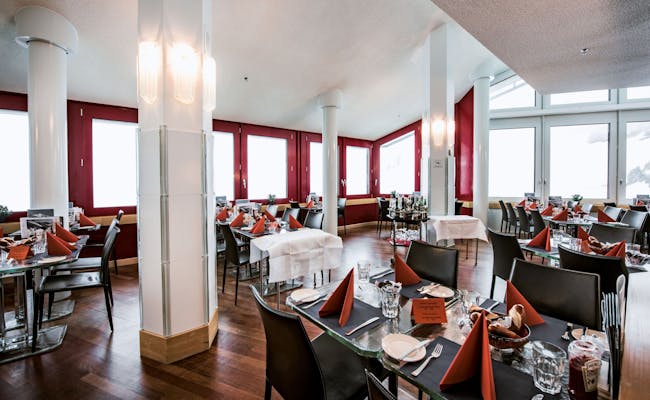 Restaurant Crystal (Photo: Jungfraubahnen)
Restaurant Crystal (Photo: Jungfraubahnen) Restaurant Aletsch (Photo: Jungfrau Railways)
Restaurant Aletsch (Photo: Jungfrau Railways)The Top of Europe Shops are souvenir stores offering chocolate, watches or clothing directly on the Jungfraujoch. They form the center of the Top of Europe Flagship Store. Special decorations are designed to make shopping a pleasure.
These include the historic Eiger Ambassador Express right at the entrance, entire ceilings made of Swiss Army knives or silver leaves, and giant replica watch movements. Visitor guidance is provided by a replica train track that runs through the entire store.
In addition to useful items such as forgotten hats, warm clothing or sunscreen, visitors can also find valuable souvenirs such as Swiss Army knives, watches or perfumes. Customers have the opportunity to create their own Swatch with motifs from the Jungfrau region in the Swatch Store. It will be printed directly on site.
Lindt chocolate, luggage or carved wooden figures are offered as well as snow globes, magnets, key rings and other small souvenirs. In the Lindt store, visitors can directly experience the production of chocolate.
The Top of Europe Flagship Store extends over two floors and also contains a Jungfrau Railways competence center, the "Rail Info & Ticket".
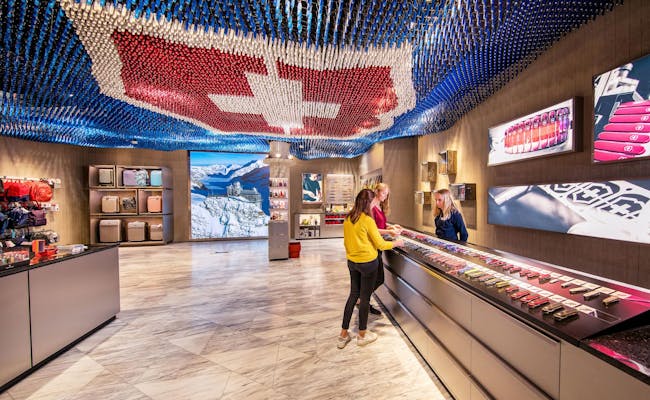 Top-of-Europe Flagship Store Victorino (Photo: Jungfrau Railways)
Top-of-Europe Flagship Store Victorino (Photo: Jungfrau Railways) Lindt Shop (Photo: Jungfraubahnen)
Lindt Shop (Photo: Jungfraubahnen)Even in summer, the weather changes quickly and should be checked in any case before a visit. Winter clothing is appropriate even in summer, plus headgear and sunscreen.
There is snow at the Jungfraujoch even in summer. At the same time, the sun shines in particular strength, as it is reflected by ice and snow. The weather can change very quickly on the Jungfraujoch, on the glacier and surrounding regions. Weather-appropriate clothing therefore means warm clothing (onion style), sun protection, sunglasses, gloves and warm headgear even in summer. On each excursion are also required especially slip and waterproof mountain boots.
The weather is often unpredictable in the Jungfrau region. The average annual temperature is about -8 degrees Celsius and even in summer only slightly above freezing. Extreme temperatures rarely reached are -37 and +18 degrees Celsius. Heavy icing and snowfall lead to increased avalanche danger. The average wind speed measured per year is about 25 km per hour, towards evening and at night gusts reach up to 60 km/h, mostly the wind blows from south-southeast. There is fog on the Jungfraujoch on about half of the days in the year.
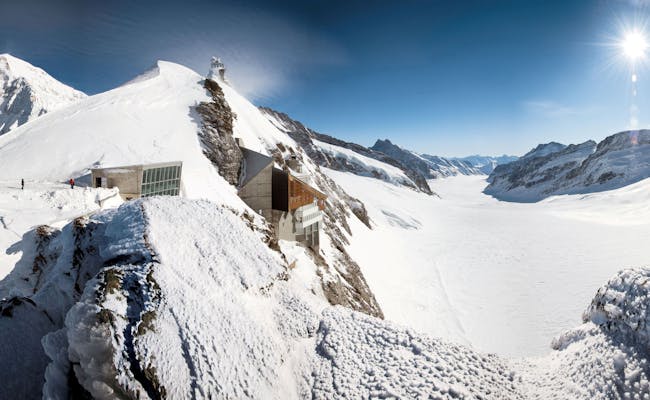 Berghaus Aletsch Glacier (Photo: Jungfrau Railways)
Berghaus Aletsch Glacier (Photo: Jungfrau Railways)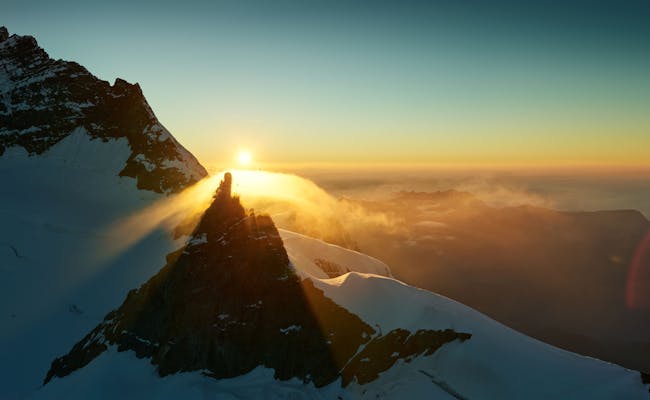 Sphinx View at Sunset (Photo: Jungfrau Railways)
Sphinx View at Sunset (Photo: Jungfrau Railways)The Jungfraujoch connects the four-thousanders Jungfrau and Mönch. It is located right on the border between the cantons of Bern and Valais.
You can access the Jungfraujoch by foot from the south via the Aletsch Glacier as an easy trekking tour, though it is risky due to crevasse dangers in the Jungfraufirn. An ascent from the Bernese Oberland is a demanding high-altitude climb that is only feasible in good weather.
Cog trains from the Wengernalpbahn run to the Jungfraubahn station in Kleine Scheidegg from both Grindelwald and Lauterbrunnen.
Driving from Interlaken to Grindelwald (Terminal) takes just under half an hour via Grindelwaldstrasse.
The Berner Oberland Bahn also reaches Grindelwald Terminal in half an hour. Trains depart from Interlaken Ost every 30 minutes.
There are two large parking garages available for visitors arriving by car. One is located in Grindelwald Terminal, and the other is in Lauterbrunnen.
The parking garage in Lauterbrunnen has a height of 2.50 m and is continuously open. Tickets can also be booked online. The parking garage in Grindelwald Terminal offers 1,000 parking spaces and can also be booked online. Entry and exit are managed via a QR code.
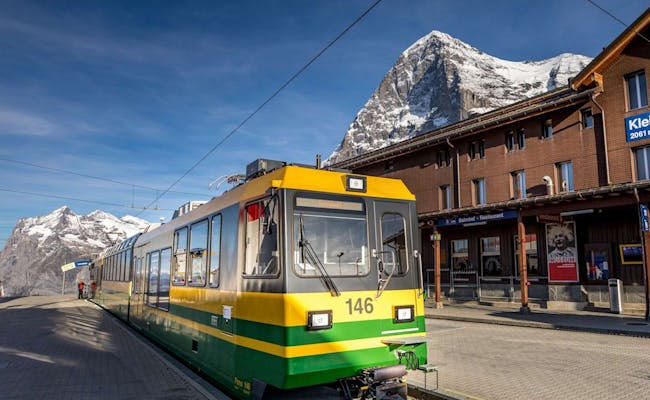 Kleine Scheidegg Station (Photo: Jungfrau Railways)
Kleine Scheidegg Station (Photo: Jungfrau Railways) Parking garage (Photo: Jungfrau Railways)
Parking garage (Photo: Jungfrau Railways)The Jungfraujoch is nicknamed “The Top of Europe” for good reason.
Its associated Railway Station is indeed the highest in all of Europe, situated over 3400 m above sea level. As a saddle connecting two significant mountains of the Bernese Alps (Jungfrau and Mönch), it enjoys some of the most picturesque views Switzerland has to offer.
Combined with a modern infrastructure and additional sights below its observatory, the summit is the perfect destination for an exciting day trip. Below are our 12 best tips for your first trip to Jungfraujoch.
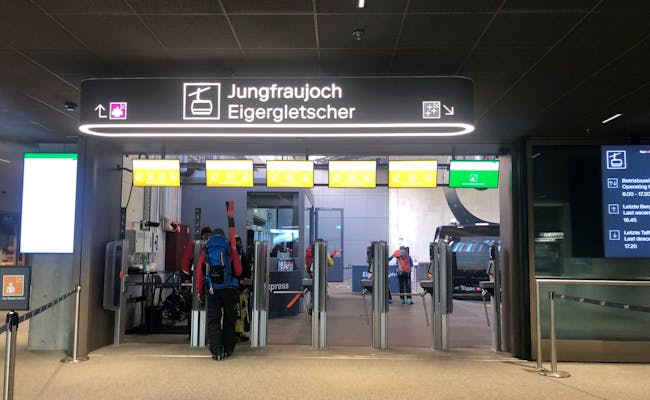
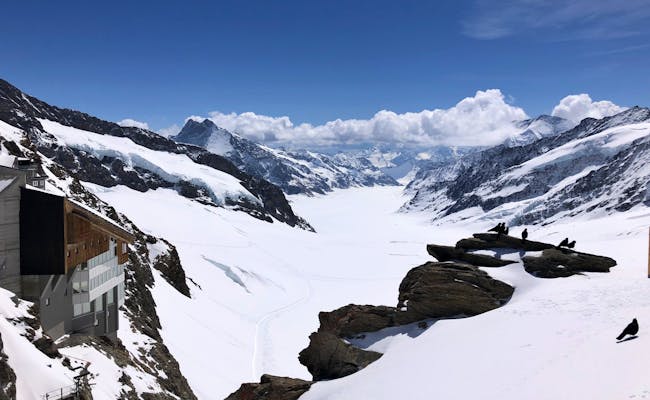
While staying hydrated should be one of your daily priorities anyway, it becomes even more important when in high altitude. Lower oxygen concentration means that you will be breathing more frequently and thus increasing your heart rate.
On top of that, air in high altitudes holds less moisture than on the ground, which can be a contributing factor to dehydration. We have found it is easier to prevent a hydration-related headache than to cure it, so make sure to drink plenty of water.
If you are worried about where to get rid of all the water you drank, we have good news. There are more than enough toilets. When nature calls, you'll be well taken care of on the way to and on the Jungfraujoch.
Toilets are everywhere, except in the trains. Since the route is partly very steep, the installation of a toilet in the train would not be without problems. But all stations, terminals, restaurants and even the middle station at the Eismeer offer enough possibilities for a short stopover.
The sun is very strong in high altitudes and can leave you with an unexpectedly red face. So make sure you come prepared with sunscreen and sunglasses.
Besides potentially complementing your chic mountain outfit, sunglasses are an essential part of any trip to the snow. The (over)exposure of UV rays reflecting from the white surface of the snow can result in a temporarily burned cornea.
Trust us when we say that looking into the snow while the sun is shining isn’t fun. So make sure you bring the strongest pair of sunglasses you can find. Your retina will thank you.
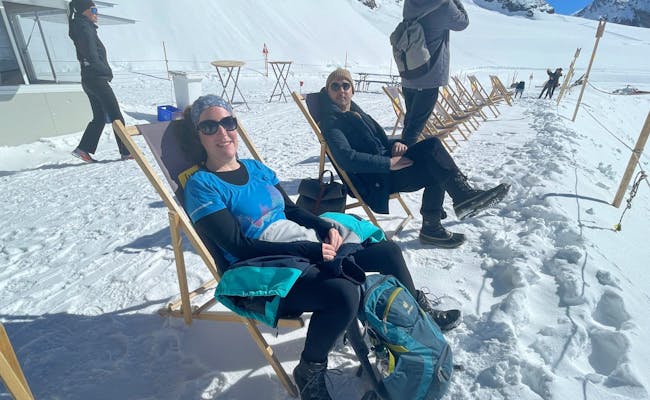
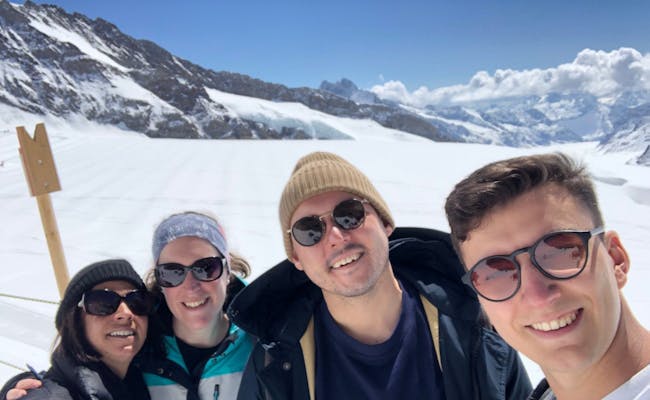
Don’t let the temperatures in Interlaken and the surrounding area fool you. Even if you decide to visit Jungfraujoch in spring or later, remember you’re at a mountain peak surrounded by snow and glaciers. Temperatures can drop below zero year-round.
Make sure to wear sturdy shoes with good soles, especially if you’re hiking to the Mönchsjoch Hut. Good footwear keeps you warm and helps prevent slips on the icy ground.
From March to October, you have the chance to hike the beautiful path from Jungfraujoch to the Mönchsjoch Hut. We recommend taking this hike to experience the snow and glaciers up close. Just be sure to stay on the path; you’re surrounded by glaciers, which can be dangerous if you step on unsecured ice.
The hike from Jungfraujoch to the Mönchsjoch Hut takes about an hour, including breaks. If you’re planning this tour, the other tips in this article will also help. They are useful for the ascent to this higher hut.
This great hike is the perfect time to pull out your camera or phone for photos. The wide mountain landscape between the two peaks provides a stunning backdrop for breathtaking pictures.
If you want to eat at the Mönchsjoch Hut, pay attention to the opening hours. Lunch is served starting at 11:30 AM. However, you can stop by earlier to enjoy a cup of coffee or tea. You can pay at the hut with cash, credit card, or Twint.
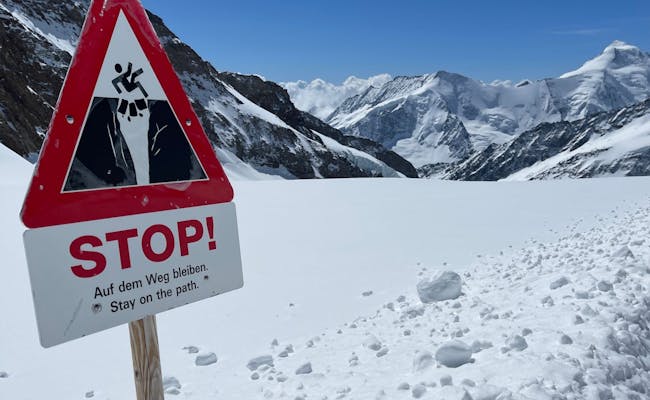
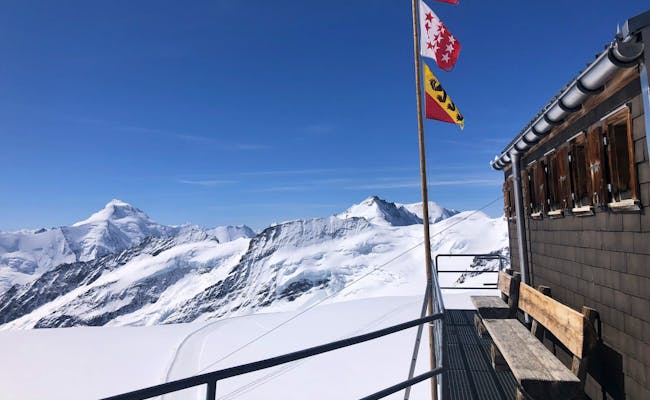
There is plenty to see and do once you are at the Sphinx Observatory. So factor in enough time to experience all Jungfraujoch has to offer.
The publicly accessible viewpoint on top of the observatory provides you with stunning 360 degree views of the mountains and its surrounding towns. Need a break? Enjoy one of the typical Swiss meals in the restaurant, while being surrounded by the lush views.
Still got some energy left in the tank? Head down to learn more about the history of the Jungfraujoch and how it was built or visit the Eispalast, a cave-like structure made entirely out of ice. The latter features ice sculptures made by various artists.
We recommend at least 4 hours if you plan on hiking to Mönchsjoch Hut and having lunch at Jungfraujoch. If it's a busy day, try and make it even more to ensure you’re not in a rush.
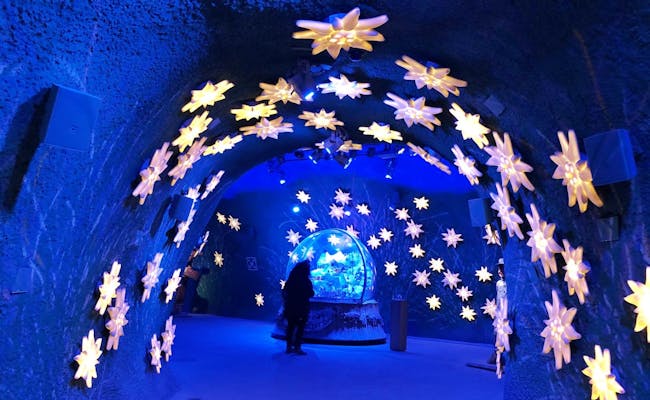
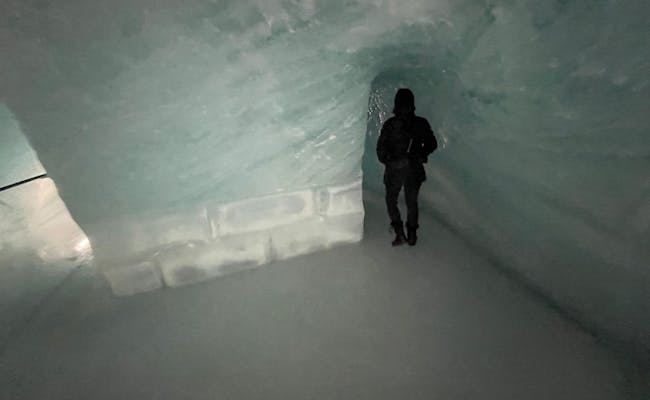
As you might have guessed, the trip to Jungfraujoch is perfect for capturing beautiful memories with your phone or camera. The vegetation and the landscape change significantly between Interlaken and the mountain peak, giving you plenty of opportunities for stunning photos.
On your way back with the cable car to Grindelwald, we recommend sitting in the direction of travel. You'll be rewarded with a fantastic view of the valley.
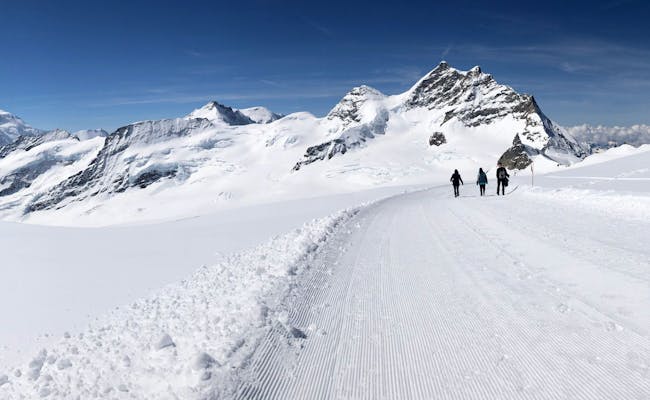
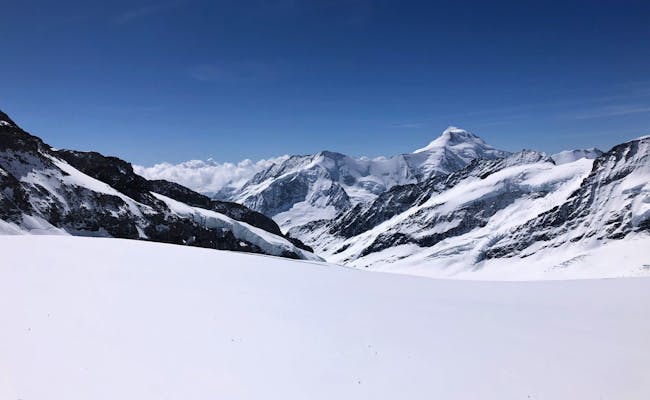
On your way to and from the Jungfraujoch, you'll need to change trains several times. Each of these moments is a fantastic opportunity to capture even more beautiful photos.
We particularly enjoyed Kleine Scheidegg, the Eiger Glacier, and the Eismeer. The latter is a quick stop between Kleine Scheidegg and Jungfraujoch, where you can get off the train for a few minutes.
Don't miss this stop and experience the glacier up close through the large panoramic windows. The staff of the Jungfraubahnen ensures that no one gets left behind during this quick break.
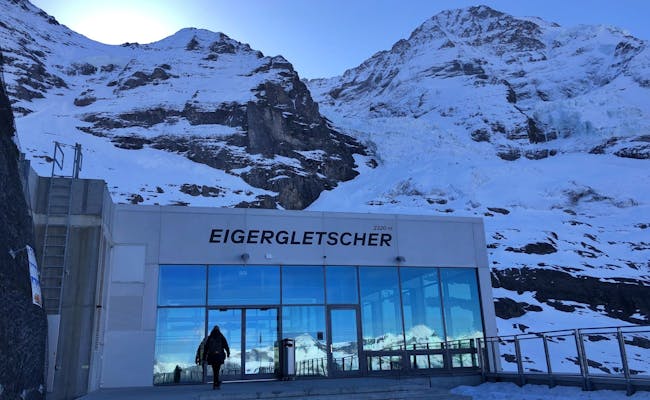
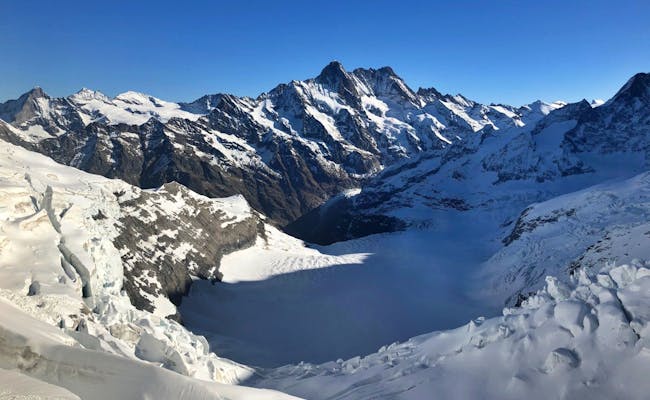
The varying air pressure can affect not just your breathing but other aspects of your trip as well. So, we recommend leaving liquids and sealed foods like yogurt in the valley. Higher air pressure might cause unwanted explosions in your bag and spoil the adventure before it even starts.
We've seen it all...
From Interlaken, you have two ways to reach Jungfraujoch. One route goes through Grindelwald, while the other goes through Lauterbrunnen. To enjoy all the views that this spectacular journey has to offer, we suggest taking one route up and the other down.
On the ride through Grindelwald, you'll get a close-up view of the impressive Eiger North Face. Conversely, when going through Lauterbrunnen, you'll pass through Wengen and can catch a glimpse of the world-famous Lauberhorn ski race downhill.
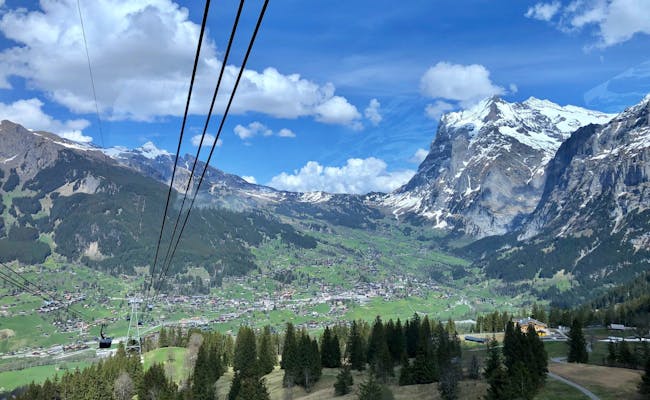
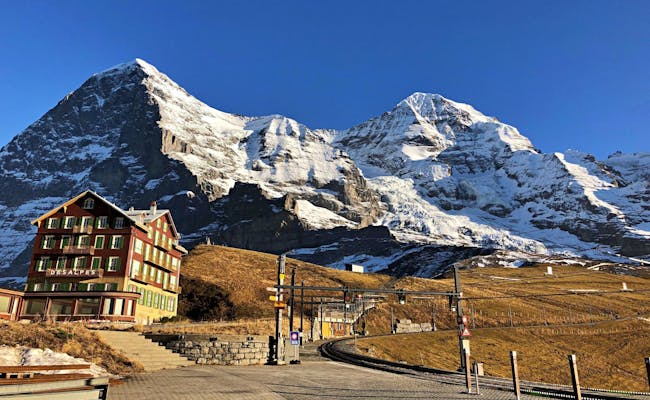
The train from Interlaken is split in Zweilütschinen. One half goes to Lauterbrunnen, while the other goes to Grindelwald. If you accidentally end up on the wrong part of the train, you will have a short time to change trains in Zweilütschinen.
However, to save yourself the additional stress, it is best to check in Interlaken that you are on the right train. If in doubt, ask the train staff at the station. They will be happy to confirm where you need to board.
This is probably the most important tip of all during high season. It gets ridiculously busy at times. You’d hate to waste your precious time waiting in line instead of enjoying the view at the Top of Europe. So make sure you have your seat reservation ready and feel like a royal while you pass all the people queuing up in hope of a free seat.
